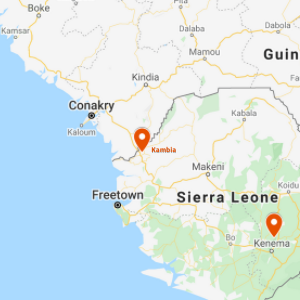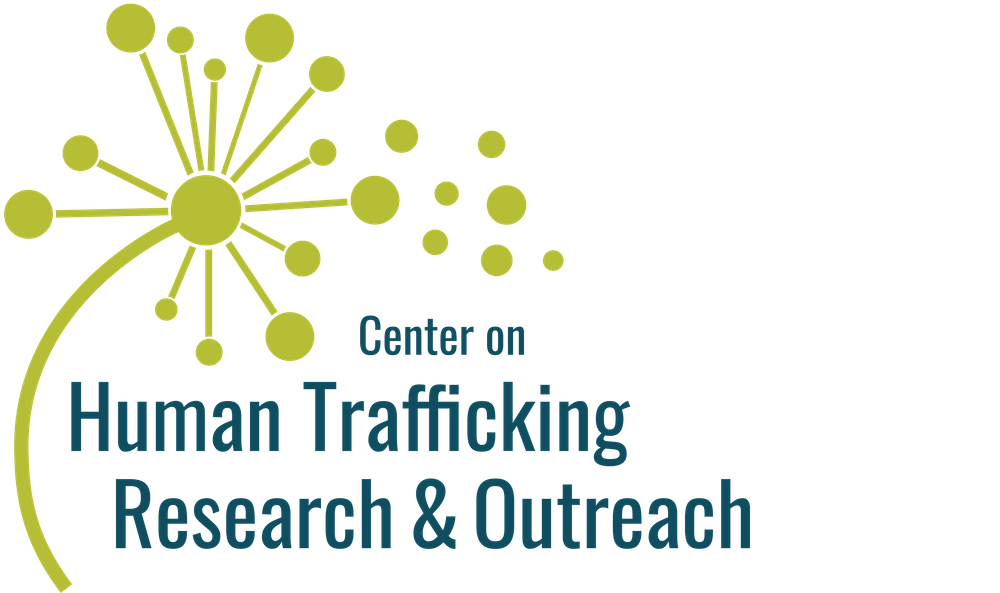Sierra Leone Anti-Trafficking Network Helps 9 Child Survivors Reach Protective Services
Monday, October 11, 2021
The recent checkpoint detention of child traffickers in northwest Sierra Leone underscores how anti-trafficking stakeholder networks are essential to supporting survivors and combatting exploitation in all its forms.

Sierra Leone police officials recently informed an African Programming & Research Initiative to End Slavery (APRIES) team member of a likely child trafficking situation in Kambia, a northern province that borders Guinea.
Early morning Monday, Sept. 20, police apprehended three adults travelling with nine children at a checkpoint near the international crossing at Gbalamuya.
APRIES Sierra Leone Country Coordinator Umaru Fofanah learned from an officer with the Family Support Unit (FSU), a specialized division attached to police units that investigates all forms of child abuse, including commercial exploitation and trafficking, that the children—four girls and five boys—ranged in age from 7 to 11, and came from Kenema, a district in eastern Sierra Leone bordering Liberia.
Fofanah connected Kambia FSU officers with APRIES’ partner World Hope International (WHI) to assess the case and, if necessary, provide protective services. Authorities moved all nine children to WHI’s Recovery Centre in Freetown. The Recovery Centre is an undisclosed residential facility where trafficking survivors receive trauma-informed care and support. APRIES works closely with WHI to ensure survivors receive high-quality protective services at the Centre. Because the Centre serves girls and boys under 5, the male survivors will eventually be moved to another shelter.
“Due to the complexity of combating child trafficking, the cooperation among anti-trafficking stakeholders at national, regional and international level is integral in identifying, referring and providing the required protective and legal services to child trafficking victims,” said Fofanah. “We are pleased that our partnership with WHI is providing such services to child trafficking victims.”
The adults are currently being held in Freetown, where FSU and the Transnational Organized Crime Unit (TOCU) are investigating the case.
KAMBIA, TRAFFICKING, AND MENPIKIN
APRIES works to reduce the prevalence of modern slavery in Sub-Saharan Africa (SSA) by transforming the capacity of community-engaged agencies, like World Hope International and FSUs, to implement prevention, prosecution, and protection strategies. APRIES is an initiative of the Center on Human Trafficking Research & Outreach (CenHTRO), based in the University of Georgia School of Social Work.
APRIES work in SSA is supported by the U.S. Department of State Program to End Modern Slavery.
APRIES recognizes the Kambia district as a Trafficking in Persons (TIP) hotspot. Child traffickers often mask their activities under the cultural custom of menpikin, an informal child fostering practice in which extended family members or trusted acquaintances remove a child from their home and community to a new location, often for educational opportunities.
Under the guise of menpikin, traffickers draw children into forced labor in agriculture, mining, domestic work, and sometimes early marriage or sex trafficking both within and outside the Sierra Leone border.
“The fact that these nine children were intercepted in Kambia re-affirms our decision to work in this border region,” said APRIES Sierra Leone Program Manager Claire Bolton. “We are so glad that the children will now receive care.”
MEASURING PREVALENCE
Alongside in-country research partner Conflict Management and Development Associates (CMDA), APRIES recently launched a data collection initiative in Kambia to provide a baseline measurement of trafficking prevalence in the district.
Five research supervisors and 15 assistants are currently surveying community leaders and residents throughout Kambia about their knowledge of human trafficking practices and its frequency in their communities.
“Results from the research will help us systematically identify existing service and policy gaps and also to have an estimate of the size and scope of the problem of child trafficking in Kambia,” said Dr. David Okech, Director of CenHTRO and professor of social work at the University of Georgia.
The work described in this article was funded by a grant from the United States Department of State. The opinions, findings and conclusions stated herein are those of the authors and do not necessarily reflect those of the United States Department of State.
